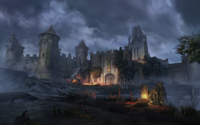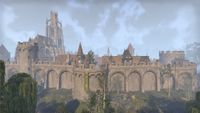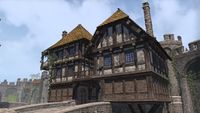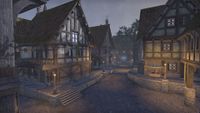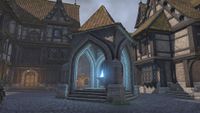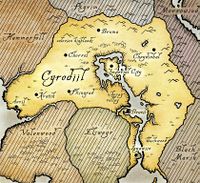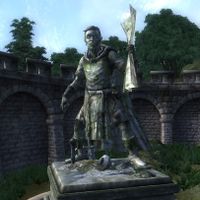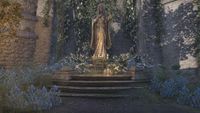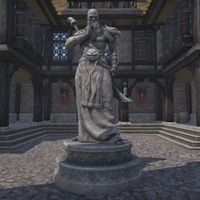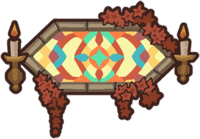Lore:Leyawiin
| Leyawiin | |
|---|---|
| Type | Settlement |
| Continent | Tamriel |
| Province | Cyrodiil |
| Region | Blackwood (Niben Forest) |
| Appears in | Oblivion, ESO |

Leyawiin is a Nibenese city in the extreme southeast of the province, by the mouth of the Niben River where it opens into Topal Bay. Known as the city that spans the waters,[1] the city straddles a swampy estuary of the Niben on the small strip of land between Elsweyr and Black Marsh called the Trans-Niben. Leyawiin is roughly divided into four districts: Chapel District, Guild Plaza, Main Street and Castle Leyawiin.[2]
The ancient symbol of Leyawiin is a white horse on a field of green, known variously as the Ivory Horse[3] or the White Stallion.[4] The origin of the city's Ivory Horse symbol is unknown. One tradition believes it to be associated with the ancient hero Pelinal Whitestrake. Another states that in the days of myth, Leyawiin was home to a shining white horse of divine strength and beauty who protected the river's banks.[5]
Topal the Pilot is the patron saint of the city, and a statue of him can be found by the southwest wall.[6][7]:363
History[edit]
First Era[edit]
After the death of Pelinal Whitestrake at the conclusion of the Alessian Slave Rebellion in 1E 243, a messenger carried the Mace of the Crusader to the human settlement of Leyawiin. Centuries later, the master craftsman Saint Kaladas built the Great Chapel of Zenithar in Leyawiin as a tribute to the legend.[8] Only a couple centuries later, Leyawiin was captured by the Khajiiti wander-kings of Bruk'ra amidst the Anequine Conquests of Darloc Brae. Scholars theorize that at this point, the invaders converted the Great Chapel of Zenithar to a Temple of Two-Moons Dance.[9] House Caro was known to rule over Leyawiin ever since the early years of the Second Empire.[5]
Second Era[edit]
The first Imperial bear cavalry came into use by the 10th Legion in 2E 23, walking through Leyawiin's streets each week in a bear parade.[10][11]
In 2E 299, Potentate Versidue-Shaie ordered the removal of Leyawiin's bridges so that large sailing vessels could pass from Topal Bay to the River Niben. However, Leyawiin's Chamber of Legates, fearing that the additional merchant traffic would simply sail through Leyawiin without stopping, managed to stall the Imperial project until it was abandoned. To this day vessels too large to pass beneath the bridges must dock south of the city and transship their cargoes to smaller riverboats.[5]
As of the year 2E 569, the Chamber of Legates held a relatively minor role within Leyawiin's governance,[5] but by 2E 582, they had risen to become a significant political force both in the city and the surrounding region. Despite Countess Caro holding the official title of ruler over Leyawiin, the practical governance of the city was primarily in the hands of the Chamber of Legates.[12][13][14]
In the mid-Second Era, during the war between the Longhouse Emperors and the forces of Varen Aquilarios, Leyawiin was allegedly single-handedly freed by Sai Sahan, who fought both Emperor Leovic's forces and his own men who had been employed by Leovic as double agents.[15] According to some other sources he was aided by allies, however.[16]
Third Era[edit]
At the end of the Third Era, the Trans-Niben was annexed back into Cyrodiil and County Leyawiin[17] due to an agreement between the Mane and the Empire. Following this, a group of Khajiiti bandits and freedom fighters known as the Renrijra Krin sought to reclaim all land along the Trans-Niben which they believed to rightfully belong to Elsweyr. They disagreed with the Mane's decision to cede the Trans-Niben and actively blamed Count Marius Caro for driving Khajiit from the county's fertile land. The city itself boasted a considerable Khajiit and Argonian population at the time. Racial tension proved to be a problem between the Khajiit and the influx of Argonians and Dunmer, and Count Caro attempted to encourage Nibenean culture in the city in order to move towards mainstream Imperial society. The city was besieged by the forces of Mehrunes Dagon during the Oblivion Crisis in 3E 433.[18]
Fourth Era[edit]
Leyawiin briefly became an independent city-state early in the Fourth Era. During this time, the county of Bravil, which had rebelled against the Empire, warred with County Leyawiin until the rise of the Mede Dynasty by 4E 48.[19] During the Great War, Dominion forces marched out of hidden camps in Northern Elsweyr, marched into Cyrodiil and flanked the Imperial defenses along the Valenwood border. The southern coastline of Cyrodiil was then overwhelmed by the invasion forces, and Leyawiin was one of the first cities to fall to the Aldmeri Dominion's invasion in Cyrodiil.[20]
Known Rulers[edit]
- The First Era
- The Second Era
- Countess Nevenia Caro (at least 2E 569 - 2E 582)[5]
- Chamber of Legates (ca. 2E 582)[12]
- Countess Nevenia Caro (at least 2E 569 - 2E 582)[5]
- The Third Era
- Father of Marius Caro (before 3E 433)[22]
- Count Marius Caro (ca. 3E 433)
Layout and Geography[edit]
Notable Locales[edit]
Gallery[edit]
Notes[edit]
See Also[edit]
- For game-specific information, see the Oblivion and Elder Scrolls Online
 articles.
articles. - Leyawiin-style Architecture and Furnishings
Books[edit]
- Guide to Leyawiin by Alessia Ottus — An overview of Leyawiin's people and notable places
- Traveler's Guide to Leyawiin by Astinia Isauricus; published 1 Frost Fall, 2E 569 — An overview of Leyawiin's people, history and notable places
References[edit]
- ^ Nocturnal's dialogue in Oblivion
- ^ Guide to Leyawiin — Alessia Ottus
- ^ Crafting Motif 101: Ivory Brigade Style — Captain Rian Liore
- ^ Knights of the White Stallion in Oblivion
- ^ a b c d e Traveler's Guide to Leyawiin — Astinia Isauricus; published 1 Frost Fall, 2E 569
- ^ Decentius Opsius' dialogue in Oblivion
- ^ The Elder Scrolls IV: Oblivion Official Game Guide — Peter Olafson
- ^ Carodus Oholin's dialogue in Oblivion
- ^ a b Stained Glass of Lunar Phases antiquity codex entries in ESO: Greymoor
- ^ Akaviri Potentate Bear Cub pet description in ESO
- ^ Akaviri Potentate Bear mount description in ESO
- ^ a b Captain Rian Liore's dialogue in ESO: Blackwood
- ^ Legate Tebeza-ko's dialogue in ESO: Blackwood
- ^ On the Chamber of Legates — Legate Tebeza-ko
- ^ Chronicles of the Five Companions 5 — Abnur Tharn
- ^ Stallion-Liege Brow Medallion item description in ESO
- ^ Shamada's dialogue in Oblivion
- ^ Events of Allies for Bruma in Oblivion
- ^ The Infernal City — Greg Keyes
- ^ The Great War — Legate Justianus Quintius
- ^ Leyawiin Outlaws Refuge loading screen description in ESO
- ^ Witseidutsei's dialogue in Oblivion

